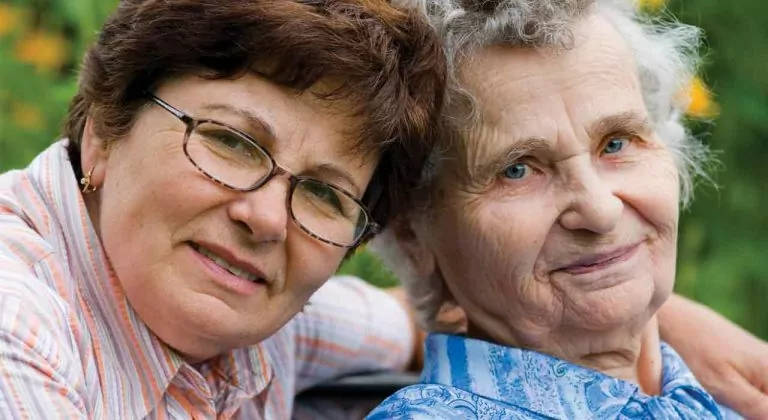Paul pulled the car into the driveway. “Okay, Dad, now stay there and I’ll come around and help you out of the car.”
“Okay.”
Paul put the car into Park, turned off the lights, and opened the door. He rounded the back of the car planning to open the passenger side back door to retrieve Dad’s walker. But there was Dad, door open, lying face down in the gravel already.
Paul was not amused.
****
Aging parents want to be independent. They want to continue living the way that they always have. They don’t want any help from strangers, and they certainly don’t want to give up their beautiful home and move into “one of those places.” What they want…may be impossible. What they have to choose between…is sometimes a choice too impossible for them to make.
Dealing with one’s aging parents is like walking barefoot down a long series of gravel roads branching in every direction. It’s painful, uncomfortable, and confusing. Sometimes suddenly, and sometimes over a period of a couple of years, offspring are thrust into the position of having to parent their parents. It’s a role reversal that doesn’t please anyone.
****
“You are NOT my mother – I am YOUR mother!” Mom yelled angrily.
“I know that,” Susan said.
“Then STOP bossing me around all the time!” Mom shouted.
Susan sat down hard on the dining room chair and put her head in her hands. “You need to take your medicine now, Mom. Please?”
****
The coming months, or years, will at times strain the relationships between the siblings, their spouses, and the aging parents. Who will help them? How often? Should someone quit a job to do so? Cancel a vacation? Who will pay the bills? Who will make the decisions that they won’t like? For those who know very little about medicine, caregiving, diseases, Alzheimer’s, or even the best way to deal with a doctor’s visit, it may be even harder.
In 2018, it’s very common to hear both the aging and their younger family members say that parents really don’t want to live any longer if they cannot live independently as they used to. They would rather die. They don’t want to be a burden. Our culture has become so health-and-happiness oriented that the Right To Die (or euthanasia) movement grows stronger every year, not only in the Netherlands but here in Canada and the United States as well. It seems that the general public can see no purpose for an imperfect human being to exist.
So when is it time to step in and step up? Each case will differ but according to one doctor, Mark Sawka, everyone always waits too long to make their decisions. Usually, by the time the senior citizens move into independent living, it should have been done sooner, and by the time they move to assisted living, they would have benefited greatly from going there sooner than that. We all want to maintain the status quo, keeping life as much like it has been as possible. Many older folks do not want to “face the music,” accepting their new limitations, and being grateful for what they are still able to enjoy.
****
“Mom, you have fallen several times lately. We are worried about you living here in this house by yourself. Please…you can come and live with Susan and me, or you can go and live with Betty and Randall. Either of us would be happy to have you,” Paul said gently.
“Oh, no, I could never do that. I won’t be a burden, and I don’t want to move away from my home.”
Paul and Betty exchanged glances. What Mom didn’t understand is that since her children lived 3 hours away, she was being much more of a burden by living in her own home than she would be living with one of them.
****
“Dad,” Susan began. “Your balance is not good. Your eyesight is nearly gone, you need constant help with your hearing aid, and to be honest, you need help with everyday things like bathing and dressing.”
“Naw, I don’t need any help.”
“Yes, you do, Dad.”
“Mum can help me, can’t you, Mum?”
Mom nodded her head, but had a weary and wary look about her. She was 82, used a walker, and took about 15 prescriptions a day, mostly to deal with back and shoulder pain. “I can help you if you stop being so stubborn!” Mom said.
Susan tried again. “You either have to move into an apartment where people can help you, or you have to have people come to your house and help you here.”
“I don’t want anybody coming into our house. I don’t need any other help.”
“What if Paul and I moved in with you?” Susan offered.
“No. Now you know that wouldn’t work. We would all end up fighting with each other. It’s hard enough for two of us to decide things, let alone having four opinions in the house,” Dad said.
“Okay, then can we get some help through the Senior Citizens agency in town?”
“We’re staying in our own home. And we don’t need any help,” Dad said with finality.
Three lessons to learn
The first lesson to learn is that the best way to make your way through it is to view caregiving as a ministry given to you by God, instead of as the burden that your parents never wanted to be. There will have to be a lot of Scripture reading and prayer for patience and guidance. In her book entitled Ambushed by Grace: Help and Hope on the Caregiving Journey, Shelly Beach says:
When I began caregiving six years ago, I did not expect to embark upon a journey of grace. I expected to learn of service and sacrifice, to explore new facets of patience and tolerance, love and forgiveness, but I did not expect to be changed at the core of my being. I did not know then what I know now — that caregiving, by the power of God ’s grace, can be a work of redemption powerful enough to reverberate into the hearts of those around us….
To make caregiving simply a task is a distortion of its purpose; rather, it is a divine appointment, a redemptive encounter, and an act of worship….
It wasn’t until I learned to relinquish my stride to His, to abandon control of my direction, and to match the rhythm of my pace to His that I discovered He was carrying me like a child standing upon her father’s shoes, clinging to his legs as she stared into his face, waiting for the next step.
The second lesson is that none of this is going to be easy. It is very difficult to explain to your dad that he simply must let a staff member (read: stranger) help him to bathe, or tell your mother that she definitely must quit driving. It is difficult for siblings who have grown apart to mesh their ideas and agree on a plan of action. It is exhausting to add to one’s already busy work and home schedule the long days of research, packing and moving, doctors’ visits, cleaning, searching for lost dentures and wedding rings, meetings, and regular visits to these loved ones.
****
“Mom, you drove 15 miles past your apartment building the other day and couldn’t find your way back. And last week you turned the wrong way and ended up going ten miles in another direction. You need to stop driving and give up your car.”
“I need my car. I can still drive just fine.”
“What if you have an accident?”
“If I die I’ll go to Heaven, and that’s fine with me.”
“Yeah, well, what if you crash into another car and hurt a woman and her baby, what then?”
“I haven’t crashed into anybody and I’m not going to.”
****
The third lesson is that there is a lot of critical information that one or more of you must learn. Information such as:
- What is your parents’ financial situation? Is Assisted Living an option (at anywhere from $3000-10,000 per month!) or will they move in with someone or have someone move in with them? Or, how do you find an affordable assisted living apartment that will give your rapidly declining father all of the care that he requires and let your parents live together in more than one room?
- How many days will the insurance company or social benefits pay for your parent to stay in rehab, and will he be released earlier if he doesn’t cooperate in physical therapy?
- When should you contact the patient advocate in the hospital to intervene when your parent is not being treated well, discharged from the hospital as promised, or given the correct medication?
- How do you sign up for financial assistance from the various government or social agencies? For example, in the U.S. the Veteran’s Administration may send a monthly check if your parent served in the Armed Forces during a war. This research and application may take many hours, but it is well worth it.
- How do you accurately and safely hook up an IV with Vancomycin antibiotic to a port in your mother’s arm every single day for 8 weeks, or give your father his daily insulin shot? What is the purpose of the medications that they are taking?
Four recommendations
I will leave you with four recommendations.
The first would be to read. Read books such as the aforementioned book by Shelly Beach and The Overwhelmed Woman’s Guide to Caring for Aging Parents, by Julie-Allyson Ieron. You may also find encouragement in John Calvin’s Golden Booklet of the True Christian Life.
Second, contact people who have gone through this and ask a multitude of questions. Ask for one of them to be a prayer partner. It’s helpful if you know someone in the medical field who is able and willing to be consulted on occasion.
Third, it’s very important to involve all siblings in decision-making, even those that are reluctant to participate. They will have opinions. If possible, encourage everyone to be involved in the care, whether it is hands-on, financial assistance, regular visits, letters in the mail and regular phone calls, doing research online, shopping, or driving a parent to one of many doctors’ appointments. It is often the case that some step forward quickly and others hang back hoping not to have to do very much. Clear communication, understanding on all sides, and forgiveness may prevent anger and bitterness from occurring.
Finally, encourage your parents in their faith in God as they live out these difficult days, and give them love in every way that you can. Remember that these loving parents cared for you when you were young, and it was not always convenient, exciting, or fun to do so. This ministry may go on for numerous years, but someday they will be gone, and you will miss them. This is your opportunity to be used by God to serve them.
Conclusion
Shelly Beach writes:
Caregiving teaches us to see what is precious and valuable in life. It teaches us what it means to live out commitment and honor. It gives us the opportunity to love someone better who we may have struggled to love in the past. It gives us the opportunity to demonstrate God is sufficient and that He is a God who redeems. Caregiving is the hardest work we will ever do because it demands that we love as Christ loved, sacrificing our time, our jobs, our commitments, our friendships, and our health, while standing against the tide of culture.…It is a call to suffer, to sacrifice, and to serve. It is a call to abandonment and tears, to hardships and difficulties. It is a glorious call to be conformed to the image of Christ and join the God of the universe in ministering grace and mercy to one of His image bearers.
There will be difficult terrain ahead, and you will likely feel fear and dread about walking this road. Remember that God is sovereign and in control of all parts of life, including this next part which can not be avoided. This, too, is part of His will.
Unlike our culture around us, we who follow Jesus Christ can know that God has promised to care for us all of our lives – even as we watch our parents get old and feeble, and then walk that path ourselves. If He didn’t have a purpose for them to still be here on the earth, He wouldn’t have left them here. Your caring for them, in whatever way you are involved, is a part of that purpose.
Sharon L. Bratcher is the author of Soup and Buns: Nourishment From God’s Word for Your Daily Struggles which is available by emailing [email protected].












